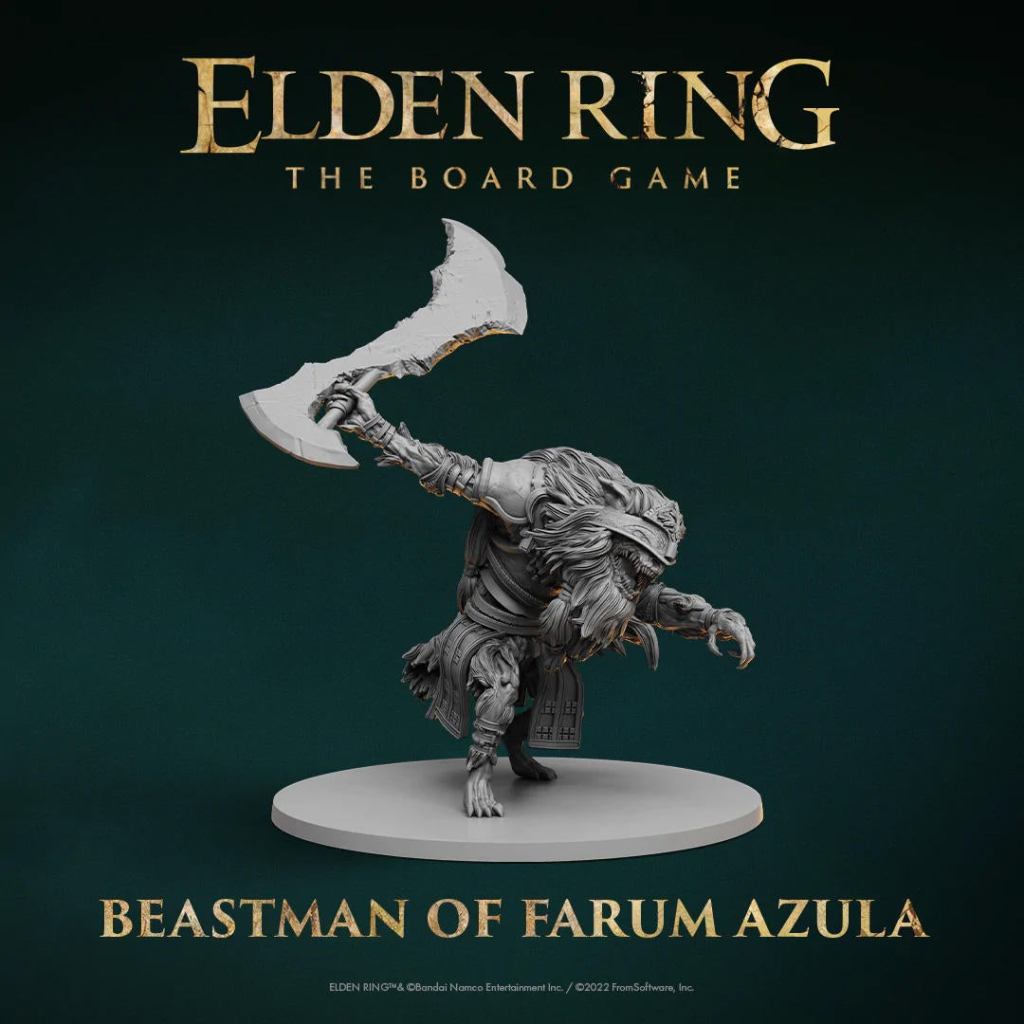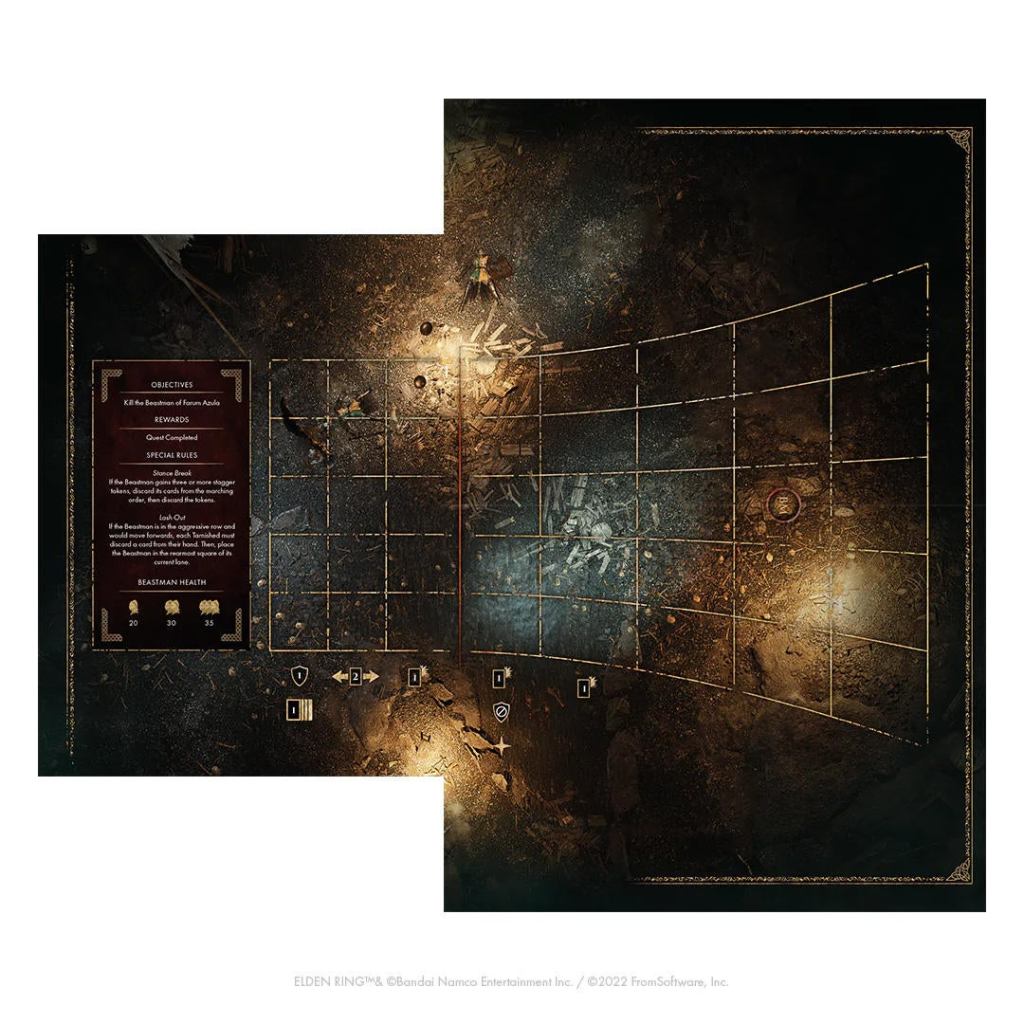Elden Ring: The Board Game will use a two-deck system for combat to replicate the nuances of the hit video game. Later this month, Steamforged Games will launch the Kickstarter for its Elden Ring board game, an adaptation of the hit FromSoftware board game. Instead of utilizing dice like in their previous Dark Souls board game series, Steamforged designed a new game mechanic specifically meant to encourage good decision making and utilizing a character’s existing skills.
Videos by ComicBook.com
“The combat system specifically was something that we spent quite a lot of time going back and forwards on,” said Mat Hart, Founder & Creative Director of Steamforged, in an interview with ComicBook.com. “There’s a number of pretty obvious route sto go down with the combat and we wanted to make sure that we captured the cerebral element of combat that you expect from a Souls game and what we were experiencing in Elden Ring.” However, the multiplayer and exploration elements also had to be factored into the combat system, which lead to a different approach.
Ultimately, Steamforged opted for a system that involves two decks of cards and a combat grid instead of the dice-based system used in the Dark Souls board games. “It focuses much more on players making good decisions, utilizing the abilities that they have or options that they have available from their weapons and from their equipment,” explained Hart. “We wanted to make sure that we were able to reflect progression of the players as they went through.”

Each player will have a combat action deck and an effect deck. The Combat Action deck is made up of cards derived from the equipment they’re wearing and the class that they’re playing. The Combat Action deck is intended to be a small deck, but it provides players with options to use in each combat. The effect deck, meanwhile, represents how much damage an attack or spell deals out. When players level up, they actually add or replace cards in the effect deck, so that their attacks become even more effective. “You are able to scale quite significantly by leveling up the right things that tailor your effect deck,” Hart noted. Upgrading a weapon will upgrade certain cards in the effect deck, mimicking how weapons become much more potent once upgraded.
Sherwin Matthews, the lead designer for Steamforged, elaborated a bit more on the deck-building process. “Your equipment is what really builds your attack deck,” Matthews said. “Axes, for example, will have less cards but they’ll be much more heavy hitting cards. So, you have deeper levels of damage, but it also means your attacks are bit slower to actually come around.” Daggers, meanwhile, will have larger decks but will vary in damage, while two-handing a weapon will allow a player to draw extra effect cards when dealing damage. “The key thing is that players will be adding these very specific icons and a couple of effects as well so they can start to tailor your deck in terms of how you want it to perform,” Matthews said.
Sorceries and invocations will work a bit differently, with players basically building up focus over time with their cards in order to unleash different spells. Just as spells in Elden Ring have different casting times and Focus costs, the board game’s spells requires different cadences and strategies to effectively use spells. “Higher end spells take a lot more focus to be able to build up and to be unleashed,” Matthews said. “But, early on you aren’t going to have something that effectively lets you generate that because you are going to be generating small amounts of focus when you play one a card from your hand. A more advanced staff will give you a lot more capacity to generate focus quicker, which is obviously really beneficial for casting those low level spells but also lets you reach the power of those higher end spells.”

The combat grid is meant to represent both distance and stances, the latter of which is a stand-in for the Poise stat seen in Elden Ring. “We created a system that allowed the miniatures on the tabletop to actually represent where they were in terms of relative distance from each other, but also what poise or what stance that they were in,” said Hart. The Battle Stance system utilizes both columns and rows to represent relative distance from each other. Different rows represent different styles of attack, with players either gaining additional effect cards (allowing them to deal more damage) in an aggressive stance or re-filling their hand of cards while in a more defensive stance.
The Elden Ring video game also puts value into understanding an enemy’s moves so that players can counter or avoid them. This was represented in the board game via an AI system that is “transparent” to the players. “The simpler mob-like enemies have a simpler mob-like behavior,” Hart explained. “Whereas the larger enemies have a more complex behavior. So when you know what you can do and when what the enemy is likely to do, you are able to then start predicting where the enemy’s going to be or even forcing the enemy to be where you want them to be to give you an opportunity to recover cards or move into a different poise or stance to manipulate the battlefield.” Hart stated that players will have the ability to work out where to move their character so they are in the right places at the right time, mimicking how players can dodge even the deadliest attack with a bit of foreknowledge.
As for why Steamforged opted for a new game system for their Elden Ring board game, Hart said that they wanted to build something that respected the video game and what made it different from Dark Souls. “There’s a slightly different requirement from a combat system for Elden Ring than there was from Dark Souls,” Hart said. “The Dark Souls board game, ostensibly, you spend 80% of your time in combat, whereas Elden Ring you don’t spend that much of a proportion of your time in combat. However important combat is, there are now other parts of the game that are incredibly important for the overall experience. There was a lot of actual mechanical considerations that drove a lot of the decision-making but we also wanted to find the emotion that we wanted to create in the player, the identity that people have with the Souls-like combat system. So it created some really nice hard constraints. And if there’s one thing that designers love, it’s really hard constraints because it really gives you something to riff off of. We had an initial idea that slightly broke the rules and wasn’t the most obvious choice and the deeper we dived into it, the more it felt like absolutely the right decision.”
More information about Elden Ring: The Board Game can be found on Steamforged’s website, with a Kickstarter campaign coming later this month.








